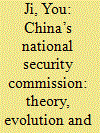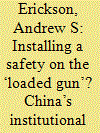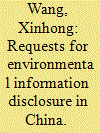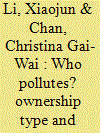|
|
|
Sort Order |
|
|
|
Items / Page
|
|
|
|
|
|
|
| Srl | Item |
| 1 |
ID:
143787


|
|
|
|
|
| Summary/Abstract |
The preservation of face is an important concept in Chinese behavioral patterns, both at individual and national levels. Beyond national interest considerations, modern-day diplomacy between China and the world also involves substantially the exchange of face. This article will argue that face represents a relational understanding of how China views and interacts with the world. By linking face to three themes that international relations scholars frequently use in describing how China sees the world, namely, the tribute system, the Chinese memory of historical humiliation and China’s distrust of the American-led international system, the article hopes to show how the understanding of face—as a crucial element of Chinese identity—can inform scholars and practitioners in their attempts to engage China.
|
|
|
|
|
|
|
|
|
|
|
|
|
|
|
|
| 2 |
ID:
143786


|
|
|
|
|
| Summary/Abstract |
Urban heritage preservation is gaining momentum in China as massive urban renovation has put many historical sites under threat. A group of renowned scholars, experts and artists have played an important role in leading and coordinating the movement. How do these cultural elites promote urban heritage preservation? How do they mediate state–society interactions and navigate the authoritarian regime to achieve their goals? This article explores how cultural elites take advantage of their intermediary position between officialdom and citizenry by not only mobilizing urban residents and the media to counter-balance the state, but also balancing different levels and sectors of the party-state against each other. Such a ‘double balance’ approach maximizes their influence within both the state and society, pushing forward the otherwise non-prioritized goal of heritage preservation.
|
|
|
|
|
|
|
|
|
|
|
|
|
|
|
|
| 3 |
ID:
143779


|
|
|
|
|
| Summary/Abstract |
The establishment of the National Security Commission (NSC) of the Chinese Communist Party (CCP) is a major regrouping of the top CCP power structure, a ‘New Deal’ in Xi Jinping’s endeavor to revitalize China. In full operation it will reshape Beijing’s national security (NS) decision-making process concerning the formulation of national security strategies, crisis management at home and abroad, coordination of national security policies and actions by Party/army/state agencies and institutional links with its foreign national security counterparts. This article argues that the NSC will primarily address the Party’s internal security concerns, which is the key link to its efforts to strike a new balance between various security typologies. It analyses Beijing’s securitization guidance and practice and constructs its organizational structure and functions.
|
|
|
|
|
|
|
|
|
|
|
|
|
|
|
|
| 4 |
ID:
143780


|
|
|
|
|
| Summary/Abstract |
As China’s active assertion of its claim to the Senkaku/Diaoyu Islands has increasingly crowded the surrounding waters and airspace with military and paramilitary forces, the risk of a Sino–Japanese crisis has reached unprecedented heights. Neither side wants conflict, but the increased frequency and proximity at which vessels and aircraft encounter one another means that overall risk has grown proportionately. Were a miscalculation or even an unintended low-level incident to occur, de-escalation would hinge on each side’s respective internal crisis management capabilities and political leaders’ ability to communicate expeditiously. This article analyzes China’s side of the ledger. Specifically, it assesses the extent to which institutional reforms since the 2001 US–China EP-3 crisis have ameliorated longstanding weaknesses in China’s crisis management capabilities and its ability to communicate via hotlines with Japan. While significant issues and obstacles to further urgently needed improvements remain, with the establishment of a Central National Security Commission (CNSC) and other recent reforms, Beijing may finally be achieving modest improvements. Bilaterally, however, no Sino–Japanese crisis hotline exists to date.
|
|
|
|
|
|
|
|
|
|
|
|
|
|
|
|
| 5 |
ID:
143785


|
|
|
|
|
| Summary/Abstract |
This article examines the importance of political elite coalitions at local levels to create institutional reform in contemporary China. By exploring Shunde’s administrative reforms under Wang Yang, Guangdong’s provincial Party secretary from 2008 to 2012, this article identifies a provincial–grassroots coalition as the essential impetus to local reforms. It argues that formation of political elite coalitions, built upon mutual trust through reciprocal interactions, is crucial for the success of reform. Within the coalition, the strong reformist provincial leader provides his leadership by becoming intensively involved in the reform process, while active grassroots cadres serve as designers and executors of reform plans. By means of a comparison between the scenarios of active grassroots cadres without Wang and Wang with less enthusiastic grassroots cadres, the article concludes that this political elite coalition is by nature fragile; if either side is not present, the coalition will collapse, resulting in either the failure of reform or a deviation of existing reforms to a less fruitful pattern.
|
|
|
|
|
|
|
|
|
|
|
|
|
|
|
|
| 6 |
ID:
143781


|
|
|
|
|
| Summary/Abstract |
Street protests have become commonplace in China. Utilizing extensive survey data, this study attempts to shed light on the nature of environmental street protests in China. The key question to be answered in the article is: why, facing the same issue, do some people choose the option of participating in street protests while others do not? Multivariate analytical findings indicate that Chinese urban residents’ willingness to participate in street protests over a hypothetical pollution issue in China is significantly related to their attitudes toward institutions in China. What motivates people to participate in street protests has a lot to do with their trust and support of the political system in China and their perceived government transparency. In other words, these protests are not just what Lewis Coser calls ‘realistic conflicts’ which primarily involve specific issues and solutions. One implication from this study is that street protests in China may not be as benign and non-regime threatening as some scholars might think.
|
|
|
|
|
|
|
|
|
|
|
|
|
|
|
|
| 7 |
ID:
143784


|
|
|
|
|
| Summary/Abstract |
2012–2013 witnessed a renewed flare-up of anti-Japanese sentiment in Mainland China, followed by a toughening of the People’s Republic of China’s (PRC) Diaoyu Islands policy. Did popular nationalism influence the PRC’s military escalation? A lack of transparency in elite Chinese decision-making puts a definitive answer to this question beyond our reach. However, this article utilizes qualitative and quantitative analyses of anti-Japanese discourse and deeds in both cyberspace and on the streets of urban China to argue that the circumstantial evidence is compelling: nationalist opinion is a powerful driver of China’s Japan policy. The demands of nationalist legitimation appear to pressure the elite to respond to popular nationalism. Should one or more Chinese die at the hands of the Japanese navy or air force, therefore, the popular pressure for escalation and war will likely be more than China’s leaders can manage.
|
|
|
|
|
|
|
|
|
|
|
|
|
|
|
|
| 8 |
ID:
143782


|
|
|
|
|
| Summary/Abstract |
This article analyzes the fairly recent phenomenon of citizens and organizations requesting disclosure of environmental information in China. Chinese citizens and organizations are invoking the new open government information regulations to push government agencies, particularly environmental protection agencies, to fulfill their legal obligation of information disclosure. By requesting that government agencies disclose environmental information, citizens and organizations have turned themselves into active agents pushing forward the implementation of the new regulations. The findings of this article suggest that a bottom-up legal mobilization in the field of environmental information disclosure, though still with a limited scope, has been happening and endeavoring to make social and political changes in China. Furthermore, this legal mobilization can be seen as an important part of emerging civil society activities in contemporary China.
|
|
|
|
|
|
|
|
|
|
|
|
|
|
|
|
| 9 |
ID:
143783


|
|
|
|
|
| Summary/Abstract |
What is the relationship between ownership type and environmental performance in Chinese firms? Using a survey of over 1,000 industrial firms in 12 Chinese cities in 2006, this article tests a number of competing hypotheses linking ownership type to environmental performance. The results show that small and medium state-owned enterprises (SOEs) on average spend less on pollution abatement technologies and are less likely to meet national emissions standards, compared to privately owned enterprises (POEs) and foreign invested enterprises (FIEs). However, the environmental performance of the largest SOEs matches that of their private and foreign counterparts. These findings are complemented by qualitative interviews and archival research conducted in 2012.
|
|
|
|
|
|
|
|
|
|
|
|
|
|
|
|
| 10 |
ID:
143778


|
|
|
|
|
| Summary/Abstract |
The current Chinese foreign and national security system suffers from problems of inefficiency, a lack of coordination and information sharing, and accountability of decision makers. China’s newly established Central National Security Commission (CNSC) is designed to build a strong platform to coordinate national security work and to strengthen unified leadership of national security at the central level. This article examines the CNSC’s foreign policy and institutional rationales. It argues that the establishment of the CNSC must be viewed in light of China’s growing power and Xi’s aspiration to play ‘big power diplomacy’ in world affairs as well as his ambition for overall institutional reforms of foreign and national security policymaking in China.
|
|
|
|
|
|
|
|
|
|
|
|
|
|
|
|
|
|
|
|
|